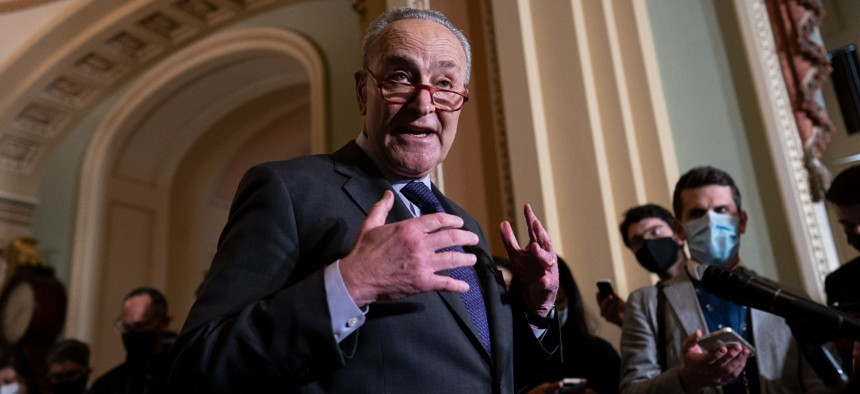Congressional Leaders Strike Deal to Fund Agencies Through Feb. 18, but Shutdown Threat Remains

Senate Majority Leader Chuck Schumer, D-N.Y., speaks to reporters at the U.S. Capitol this week. J. Scott Applewhite / AP
Some Republican senators threaten to derail plans over COVID-19 vaccine mandates.
Leaders in the House and Senate have reached an agreement on a short-term spending bill to fund agencies through Feb. 18, though the possibility of a shutdown late Friday evening remains.
The obstacles to avoid a shutdown that arose this week were twofold: the first, now resolved, was a debate over the length of a continuing resolution that would keep agencies funded at their fiscal 2021 levels. Democrats had pushed for January while Republicans had sought a longer bill, but the two sides reached a compromise Thursday morning. The second potential hold up still remains, as some Senate Republicans have threatened to slow down the process over a demand that the stopgap bill deny funding for the implementation of President Biden’s COVID-19 vaccine mandates.
The House was expected to take rapid action on Thursday to send the spending measure to the Senate. With less than 48 hours before a shutdown when the deal was struck, however, all 100 senators will have to agree to expedited consideration to avoid at least a short-term shuttering of federal agencies. Some conservative senators have said they plan to derail those plans over their objections to Biden’s vaccine mandates, saying they will take procedural action to effectively force a shutdown that would last a few days until the chamber can pass the measure. Those senators had support from the House Freedom Caucus, which wrote a letter to Senate Minority Leader Mitch McConnell on Wednesday imploring him to block rapid consideration of a CR.
Some Republicans have floated a way out of the standoff, such as by allowing for quick passage of the CR provided there is a vote on an amendment to block implementation of the vaccine mandates. As of Thursday morning, lawmakers have yet to chart a path forward.
Democrats said the stopgap spending bill, once agreed to, will keep pressure on Republicans to come to an agreement on full-year fiscal 2022 appropriations because it contains few “anomalies” that lawmakers use in CRs to provide extra funding for pressing issues. The measure does include $7 billion for resettlement of Afghan evacuees.
“While I wish the Feb. 18 end date were earlier, this agreement allows the appropriations process to move forward toward a final funding agreement which addresses the needs of the American people,” said Rep. Rosa DeLauro, D-Conn., who chairs the House Appropriations Committee. “Instead of short-term funding patches like this, working families, small businesses, veterans, and our military need the certainty that comes with passing an omnibus.”
Sen. Richard Shelby, R-Ala., the top Republican on the Senate Appropriations Committee, said on Thursday that negotiators must “get serious” about setting full-year, line-by-line spending levels for fiscal 2022, calling on Democrats to eliminate controversial policy riders and boost defense funding.
“If that doesn’t happen, we’ll be having this same conversation in February,” Shelby said.
The two parties have yet to agree on the top-line spending totals that would make up the defense and non-defense portions of the fiscal 2022 budget, stymying negotiators from finalizing the 12 individual appropriations bills Congress must pass each year.
While McConnell expressed confidence on Fox News on Thursday that a shutdown would be avoided, Senate Majority Leader Chuck Schumer, D-N.Y., was less optimistic.
“This is a good compromise that allows an appropriate amount of time for both parties in both chambers to finish negotiations on appropriations,” Schumer said on the Senate floor. “Unfortunately, it seems Republican dysfunction could be a roadblock to averting an unnecessary and dangerous government shutdown.” The majority leader added he hoped “cooler heads will prevail.”






